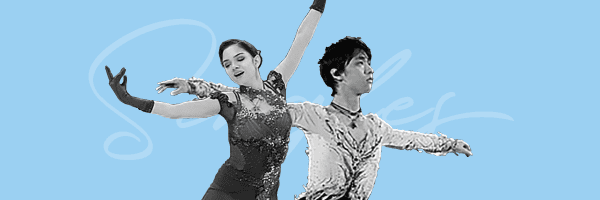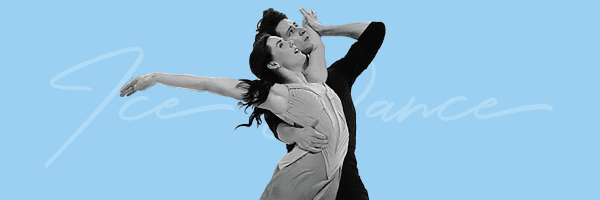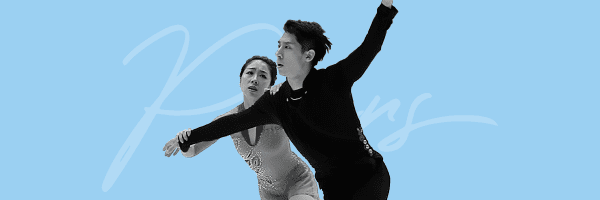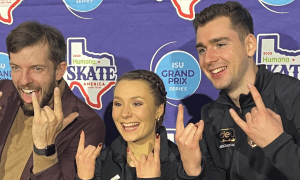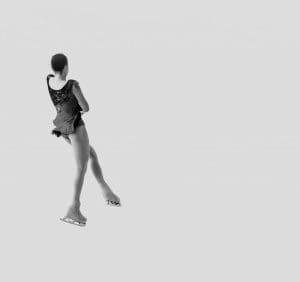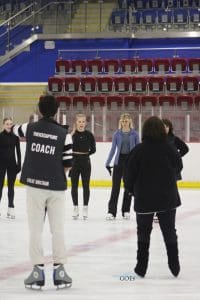Late payments hurt Vasiljevs’ preparations for Olympic season
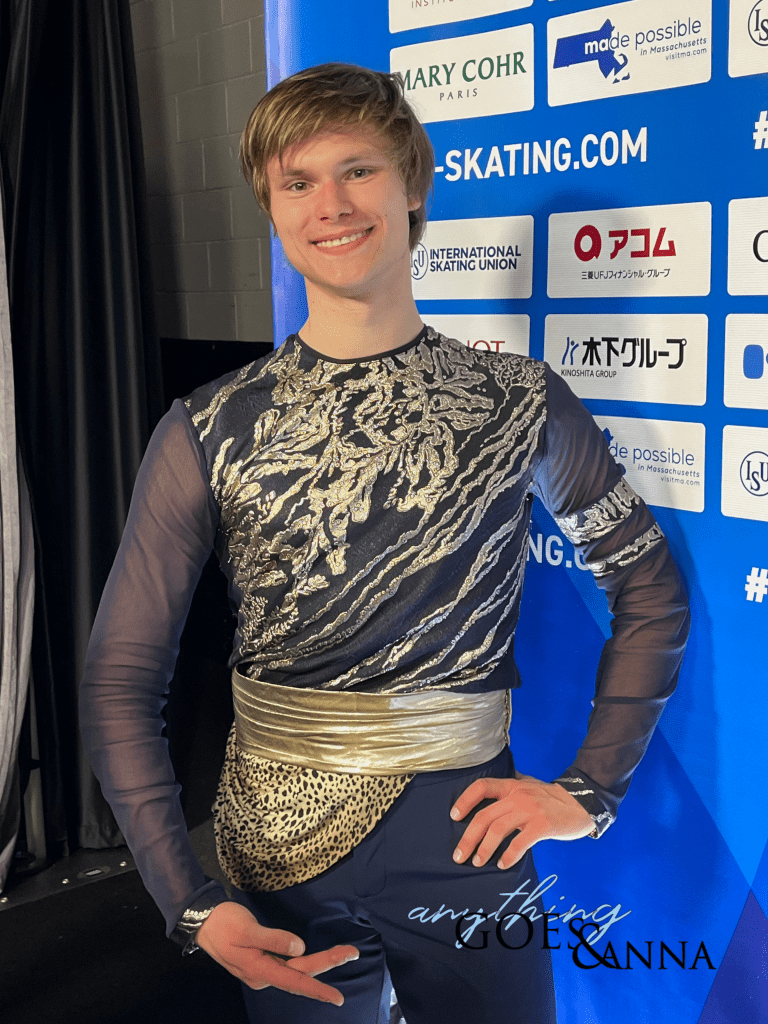
On September 14th, Deniss Vasiljevs announced his withdrawal from the Nebelhorn Trophy, which had been planned as the first competition of his season.
He wrote in a post on his Ko-Fi account: “I find myself in an undesirable situation to begin this Olympic season. Ongoing issues with the Latvian Skating Association have weighed heavily on me for the past few months and have hurt my preparation, depriving me of the mental and financial resources I need at this critical moment. Partial resolution appears to be in sight, but I must recognize that the time has already been lost.”
This is the latest fallout in the ongoing situation with the Latvian Skating Association (LSA), which has also come under fire for allegedly failing to address accusations of abuse by prominent coaches (see Anything GOEs previous reporting for more details).
“This situation left me emotionally empty”
Vasiljevs is, by far, Latvia’s most successful figure skater. He is the 2022 European Bronze Medalist, has placed as high as 6th at the World Championships, and is preparing to compete in his third Olympics after placing 19th in Pyeongchang and 13th in Beijing.
Anything GOEs requested clarification about the financial situation from Vasiljevs’ manager, Christopher Trevisan, who is also the Director of the Skating School of Switzerland. Trevisan explained that the LSA had owed Vasiljevs for competition expenses going back to the Bavarian Open in early 2024. The LSA has now paid the full amount it owed to Vasiljevs. However, the LSA still has not reimbursed the competition expenses for Sofja Stepcenko, who also trained at the Skating School of Switzerland for the 2024/2025 season.
Trevisan confirmed that the money owed to skaters included travel stipends for Grand Prix events in Fall 2024 (Skate America for Vasiljevs and Stepcenko, and Cup of China for Vasiljevs). Importantly, a lot of the funds due represented money that the LSA had simply to deliver, not to raise. For these events, the competition organizing committee pays a flat rate fee for each skater to travel to and from their training location to the host city. This fee is paid directly to the skaters’ national federation, which is supposed to pass the money along to the skaters so that they can reimburse their travel expenses; however, the LSA did not reimburse Vasiljevs for the 2024 Grand Prix travel until September 2025, and still has not reimbursed Stepcenko.

Trevisan explained that, as usual, he submitted a detailed invoice of Vasiljevs’ expenses from the 2023/2024 season at the end of that season. When he received no response or payment, he sent several reminders during the 2024/2025 season. At the end of the 2024/2025 season, he submitted the full expenses for that season, as well as reminding the LSA about what was owed from the previous season. Trevisan further stated that when the invoice was not paid, Vasiljevs also directly contacted LSA President Uldis Šauers. After several more weeks of delay, Vasiljevs was no longer able to reach Šauers. At that point, in the late summer of 2025, Trevisan and Vasiljevs reached out to the ISU and to the Latvian Olympic Committee (LOC) for help. Trevisan said that it was only when the LOC became involved that the situation started to be resolved.
On September 17th, three days after Vasiljevs’ Ko-Fi post, LSA Secretary General Anna Belevica, told Sportacentrs.com that Vasiljevs had now been fully reimbursed. “There were also payments from the previous season, the total amount was in five figures, and it really came late, but now it has been settled, we are in regular contact with Deniss. To be fair, it should be noted that a detailed request for funding from their side was also late, and such things are not really a one-day matter, maybe that’s why he felt a little offended or something like that. But I emphasize that this situation is currently sorted out.”
It may be sorted out financially, but some of the damage inflicted couldn’t be repaired. Vasiljevs emphasized that the months of delays and uncertainty hurt his ability to trust in the support of his federation and negatively impacted his preparations for the Olympic season. He wrote in his Ko-Fi post on September 14th, “Part of my naïve and idealistic identity died in this hard period. It came to a point that I had to start rationing on my work spending…That resources malnutrition led to slow performance atrophy…I had accumulated so much stress that this situation left me emotionally empty.”
In a follow-up Ko-Fi post on September 21, Vasiljevs thanked his fans for supporting him. “You all lifted my motivation and your opinions greased the cogs in the state’s machine.” He shared, “Not out of the woods yet but I can see through the canopy…The past debts from LSA are settled and path forward is roughly planned. The paperwork is in the process. I hope all things with LSA will be finalised this week.”
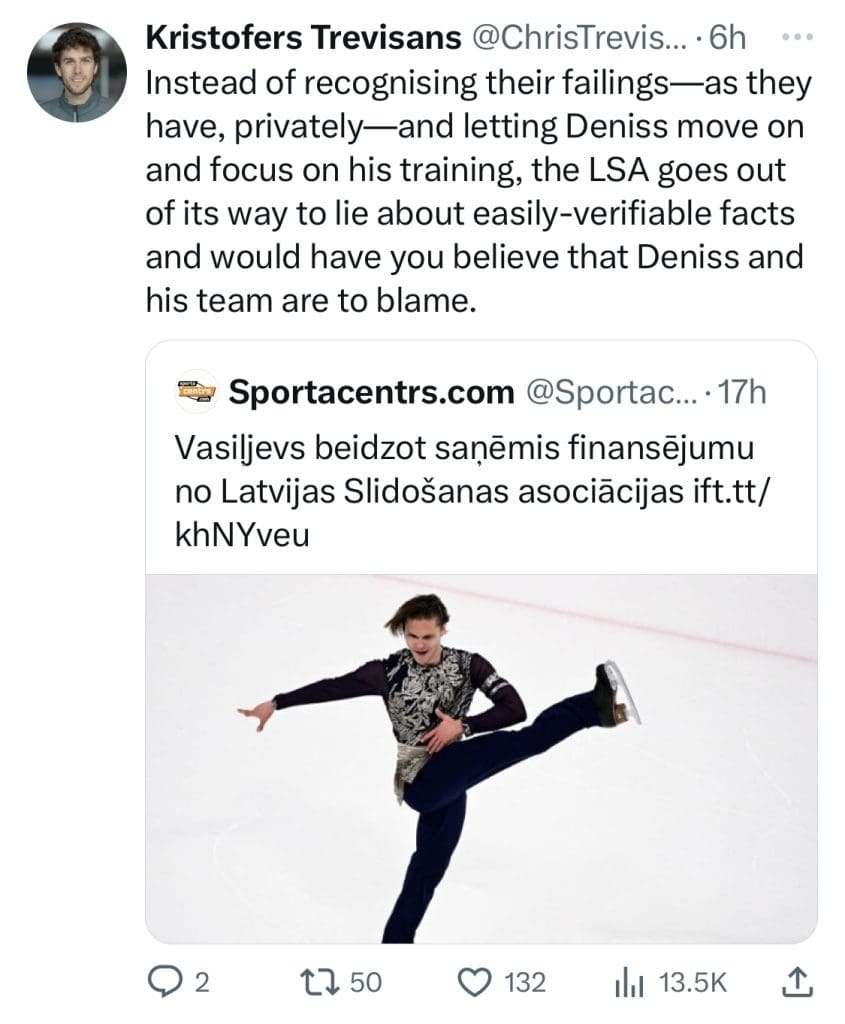
On September 22, Latvian media SportaCentrs.com reported that they were told by Šauers that “The LSA has repeatedly asked that the invoices for them are submitted in a timely manner, but his manager has only done so in the summer, and submitted it for the whole period together.” He also alleged that a few hundred Euro of the receipts were not for competition expenses.
In response, Trevisan posted on X: “Instead of recognising their failings—as they have, privately—and letting Deniss move on and focus on his training, the LSA goes out of its way to lie about easily-verifiable facts and would have you believe that Deniss and his team are to blame.”
He further explained to Anything GOEs: “We’ve had to deal with Uldis’ lies privately and we could make our peace with those, however, this time he chose to go to the public with more lies, blaming Deniss and his team. Although we do not wish to escalate this conflict and would instead prefer for Deniss to be able to focus on his training and his preparation for the Olympic season, we cannot leave these unchallenged.”
He rebutted Šauers’ explanations in detail:
“(1) On what was due: It was not just about competition expenses from last season, but also from the season before that, going back to January 2024 and including the Worlds 2024 where his placement in the Top 10 created the possibility to earn two spots for Milano at Worlds this year.”
“(2) On the expenses themselves: There was not a single expense in the report that was not for a competition. When the LSA finally agreed to meet to discuss the situation (just two weeks ago!), the only question they had on the reports were about ancillary expenses that were incurred on-site, during the competitions, representing only about 0.6% of the total amount. We voluntarily removed them as a gesture of good-will so there wouldn’t be any hold-up to reimbursing Deniss what he was due.”
“(3) On the timing: The LSA received the detailed expense reports at the end of each season, meaning in April 2024 and April 2025, as was the practice. We sent reminders during last season as well as throughout this spring and summer. They either ignored these messages or claimed that they would get back to us “next week”. This went on for months with no progress.”
“(4) On the Nebelhorn Trophy: Deniss decided to withdraw due to the impact that this situation had on his ability to prepare for the competition, both mentally and financially, as he described in his post. The LSA did commit to covering the expenses; however, they were not willing to sign an agreement confirming it, nor did they make a deposit to guarantee their commitment. Deniss trusted them before, and he ended up in this terrible situation; he will not make the same mistake again.”
Trevisan concluded: “The LSA’s attempt to shift the blame is regrettable. It further erodes Deniss’ trust in his federation and only justifies his cautious approach towards the new season.”
The lack of support from the LSA has also impacted Sofja Stepcenko’s financial situation. In July 2025, she created a GoFundMe to help cover her health insurance and housing costs. When Stepcenko later went public with abuse accusations against her former coaches, Olga Kovalkova and Raimo Reinsalu, Kovalkova cited the existence of this GoFundMe as evidence that Stepcenko was seeking financial gain from her allegations. However, Stepcenko had closed the GoFundMe before her allegations were published.
Anything GOEs reached out to the LSA for an update on the payments still owed to Stepcenko, but has not received a response.
Missing Financial Records
It is unclear if any other Latvian figure skaters besides Vasiljevs and Stepcenko have had issues with competition payments owed by LSA. A different Latvian skater, who asked to remain anonymous, confirmed to Anything GOEs that during the 2024-2025 season, the LSA directly purchased tickets for travel and hotel accommodation when that skater was representing Latvia at an international competition.
The period of non-payment corresponds roughly with Šauers’ election as the President of the LSA, in May 2024. Since May 2024, the federation has also had three different people in the position of Secretary General.
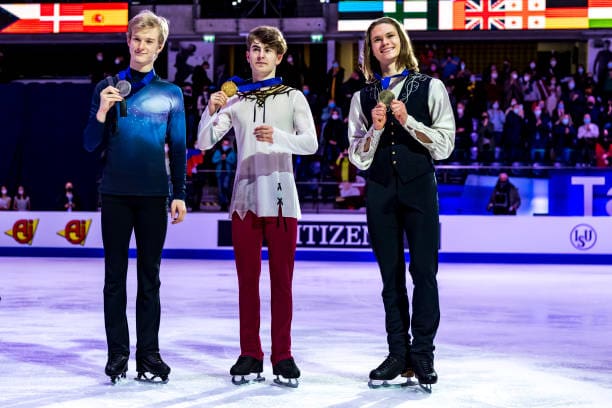
In March 2025, speed skating coach and former LSA board member Evita Krievane told Latvian television program Sporta Studija that the top two short track skaters in Latvia hadn’t received payments that they were owed from the LSA. Those payments, totaling several thousand Euros, were more than two months late, and, according to Krievane, the response from the LSA office was that they didn’t know if the federation had the money. Krievane resigned from the LSA board because she believed the poor standard of communication and financial management made it impossible to work on any projects to improve short track and speed skating in the country. “The structure is exactly zero. There is none at all. And there never has been… We write a letter to the federation—and we’re likely to not receive an answer.”
Latvian media also reported in March that important financial records were unavailable, even to members of the board of the LSA and its Vice President, Aivars Zeltiņš. Zeltiņš told Latvian Television that “he had only received account statements from the state treasury account, or the one that the federation uses to receive state funding. He has not seen the overall situation….”
At that time, Šauers denied that any records were missing, telling LTV that Zeltiņš had received the information he requested, and denying that any member clubs had been kept from financial information.
However, the financial records available on the LSA website remain incomplete. For example, the 2023 report on the use of state funds is missing, and the 2024 annual report, while posted, does not include a balance statement. Also missing are the Annual Member Meeting minutes from 2024, when Šauers and the current board were elected, and any board meeting minutes from 2025.
When Anything GOEs asked about the missing documents, on August 12th, the LSA responded that the 2023 and 2024 annual reports were available online. On September 13th, Anything GOEs followed up about the specific gaps in the reports, but has not yet received a reply.
According to the available reports, the federation has been going through a difficult financial period. The LSA has had lower income than expenses in three of the four years from 2021-2024, for a total loss of 154,617 Euros.
| Year | Income | Expenses | Net |
| 2021 | 234,440 | 271,872 | -37,432 |
| 2022 | 485,103 | 473,651 | 11,452 |
| 2023 | 194,029 | 243,014 | -48,985 |
| 2024 | 363,736 | 443,388 | -79,652 |
| Total for Quad | 1,277,308 | 1,431,925 | -154,617 |
One member of the LSA board, who spoke to Anything GOEs on the condition of anonymity, confirmed that the federation has struggled to raise funds. “LSA income comes from the state budget grant, ISU support payments, sponsorship support, and membership fees. For such a small sports organization as LSA, the financial resources are insufficient to fully cover the annual upkeep of high-level athletes. Athletes or their managers, together with LSA, must also work on attracting individual sponsors for specific athletes. For high-level athletes, it is important that LSA covers all direct competition costs— travel, accommodation, and meals. The LSA’s largest expenses go toward supporting high-level athletes. LSA has only one paid employee—the Secretary General—and one small office space. Most expenses are directed toward supporting high-level athletes, as well as organizing the Latvian Championships and other smaller costs.”
The LSA board member continued: “LSA must find a balance between supporting the children’s and youth system and covering the expenses of high-level athletes. Financial resources are limited, but in order for world-class talents like Deniss to emerge, there must be broad participation at an early age, from which new talents can develop.”
Although sources of income may be scant, according to the most recent balance sheet, from 2023, the LSA had reserves of 192,278 Euros. After the losses of 79,652 Euros in 2024, the reserve would presumably still have been 112,626 Euros at the start of 2025.
Nonetheless, Latvian coach Karine Magone told Anything GOEs that the LSA has cited its lack of funds when explaining recent decisions, such as charging a 100 Euro entry fee for the 2025 Test Skate and deciding not to pay expenses for Latvian athletes competing on the Junior Grand Prix.
A history of “breaking athletes”
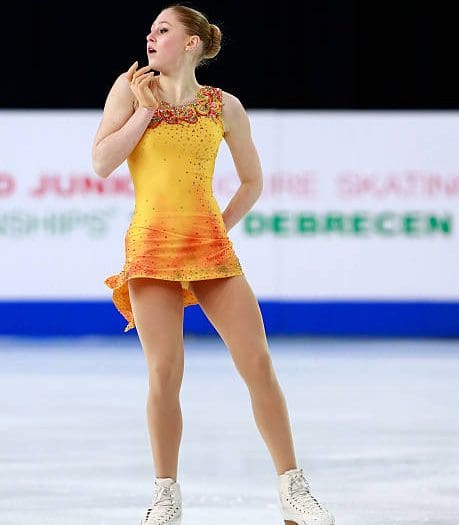
According to a former top Latvian athlete, inconsistent funding and unclear criteria to earn federation support have long been a problem in Latvian figure skating.
Diana Nikitina represented Latvia at the 2018 Olympics, and recently explained to Anything GOEs how the LSA’s approach to funding damaged her career and the careers of other promising skaters.
As a junior, Nikitina felt like she was chasing an ever-moving set of criteria for funding. At her first Junior Worlds, in 2015, she was told she would need to place in the top fifteen in order to get funding. “I ended up tenth, which is pretty amazing in general for a junior skater in Latvia…Then [I’m] like, ‘Okay, so you said top fifteen, I’m in top ten. So maybe we can have something from you, a little bit of help. That would be amazing…’ They’re like, ‘You’re too young. So I don’t think so.’”
The next year, she says she was told that in order to qualify for funding, she would need to be top five in a Junior Grand Prix event, top nine at Youth Olympics, and top ten at Junior Worlds. “That year, again, I did my goal. I outdid myself. I overworked. I [was] skating in Russia at the same time, and it’s a lot of training, but it’s working, you know? And again, [Junior] Grand Prix fifth, Youth Olympic Games, fifth, and Junior Worlds, [I was in the] top ten.”
“[At] the end of the season, [I said] ‘So, okay, I showed what you wanted, all of the criteria that you asked from me.’ And then they were like, ‘Yeah, you have to prove it more.’ Prove what more? I cannot jump over my head, right? I’m doing my best already. And I’m actually already getting the best results as a junior. Every single year, [Latvia has] seven spots for the Junior Grand Prix… and still it’s not enough in the end. My parents were working, I’m sorry, their asses off, to actually pay all of this…And at some points, I’d say [I was] miserable, when I have to prove something, and when I prove, they say that it’s still not enough.”
At 16, she decided to switch from her coaches in Saint Petersburg to train in Switzerland with Stéphane Lambiel, who was already coaching Vasiljevs. “We asked for help [from the LSA], and they’re like, ‘You want to just skate in the resort.’ That’s what I’ve been told. And I was like, ‘That’s not what I want. I’m telling you that I want to go to the Olympics.’”
The Olympics had always been Nikitina’s motivating ambition.
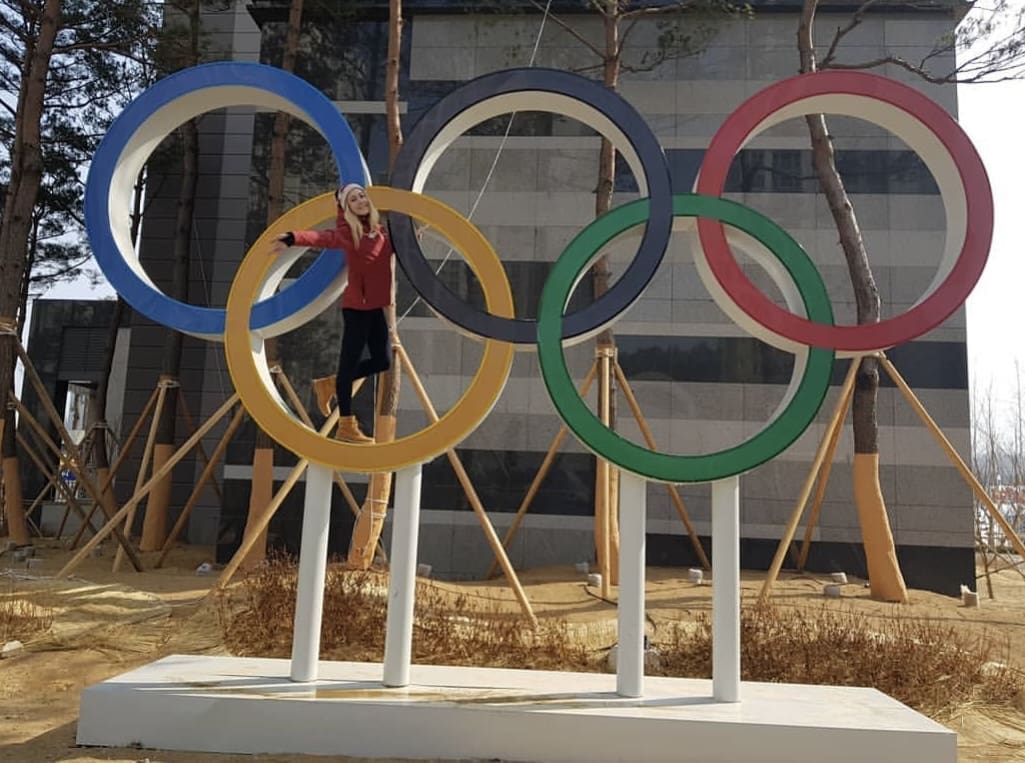
“When I was four, we had this funny moment when everybody was asking, ‘Who do you want to be?’ And I was like, ‘I’m gonna go to the Olympics.’…My parents never actually were thinking that we’re gonna go to the Olympics, but I was like, ‘I have a goal. I’m doing it. That’s it. I don’t care what everybody else [is] going to say.’”
After Nikitina competed in Pyeongchang, placing 26th, she had to find a new motivation to continue, which was made more complicated by an injury and the prospect of a long recovery from surgery.
“When I knew that I had the surgery coming up, and that I [would] have to wait it out for a year, [I knew] because I’m not skating, no [sponsors] are going to stay with me and pay me money and help me…so we asked for help [from the LSA]. I went for a talk and I said, ‘This is going to be a tough year, if you could just a little bit help, that would be nice. Because we didn’t really get anything from the Federation in general [up until now].’ And they said, ‘No, you are not an athlete of high results.’ That’s what I got. And that day, I was sitting down [and thinking], okay, I’m already 17. I understand, I have my own brain, and I was like, for what reason do I do this? For what reason do I actually kill myself on that ice if nobody needs [me]? And I lost the motivation, and then I stopped skating. With that, everything ended.”
“I’d say in the end, [the federation’s behavior] stopped my career…It’s like, you could do all of that work to try to come back to being in competitive form. And for what, if they’re not going to be supporting?”
“I said, ‘Give me the skaters who are going to be better than I was all these years.’ And what do we have now? We have actually, for this season, no one. No [women] in the seniors, and no one who could go to the Olympics…I’m sorry for Sofja [Stepcenko], for what happened to her, and I totally understand that mentally, she was just destroyed by everything.”
Nikitina also wonders what happened to the money that was supposed to have supported her in the Olympic year, funding that the Latvian Olympic Committee gave to the LSA in order to help athletes prepare for the games.
“[The LSA] said we’re going to pay everything, [and] actually the money was given [from the LOC] and we know that. That money went somewhere, but we don’t know where…They’ve been saying that the equipment and all of that stuff would be covered, the dresses and all of this… And in the end, we paid ourselves.”
The LSA also did not reimburse Nikitina for her travel to Pyeongchang, which she had expected them to do.
Nikitina spoke to Anything GOEs on September 15th, the day after Vasiljevs went public about his financial situation. “I don’t understand how, after all of these years, they can actually stop supporting Deniss,” she said. [He] brought everything to Latvia, so many fans and everything, actually showing that in Latvia, there are skaters. Yes, of course, we [didn’t train] here. We were raised in Latvia as kids, but we found a way to develop ourselves, to get better in different countries. But still, I am sorry, I’m representing my country. I didn’t turn away. I didn’t change the citizenship. I didn’t change my flag or anything.”
Nikitina believes that there is a bias within the Latvian skating community against training abroad, which she says hurts the development of the sport within the country. She compared this to the experience of Estonian skaters, who have frequently trained for periods abroad, and brought back that knowledge to benefit the next generation.
“I hope that [Deniss] manages this season and everything is going to be fine. But I’m sorry, you’re just breaking athletes. You’re not giving them anything. You’re just breaking them.”
Read Part One: “Its Not Worth Your Life”: Latvian Skaters Speak Out About Abuse
Read Part Two: New Allegations Emerge as Latvian Club Defends Coaches Accused of Abuse
Read Part Four: Latvian Police Investigating Abuse by Coaches
Read Part Five: ISU, Lithuanian Olympic Committee, Suspend Coach Accused of Abuse

